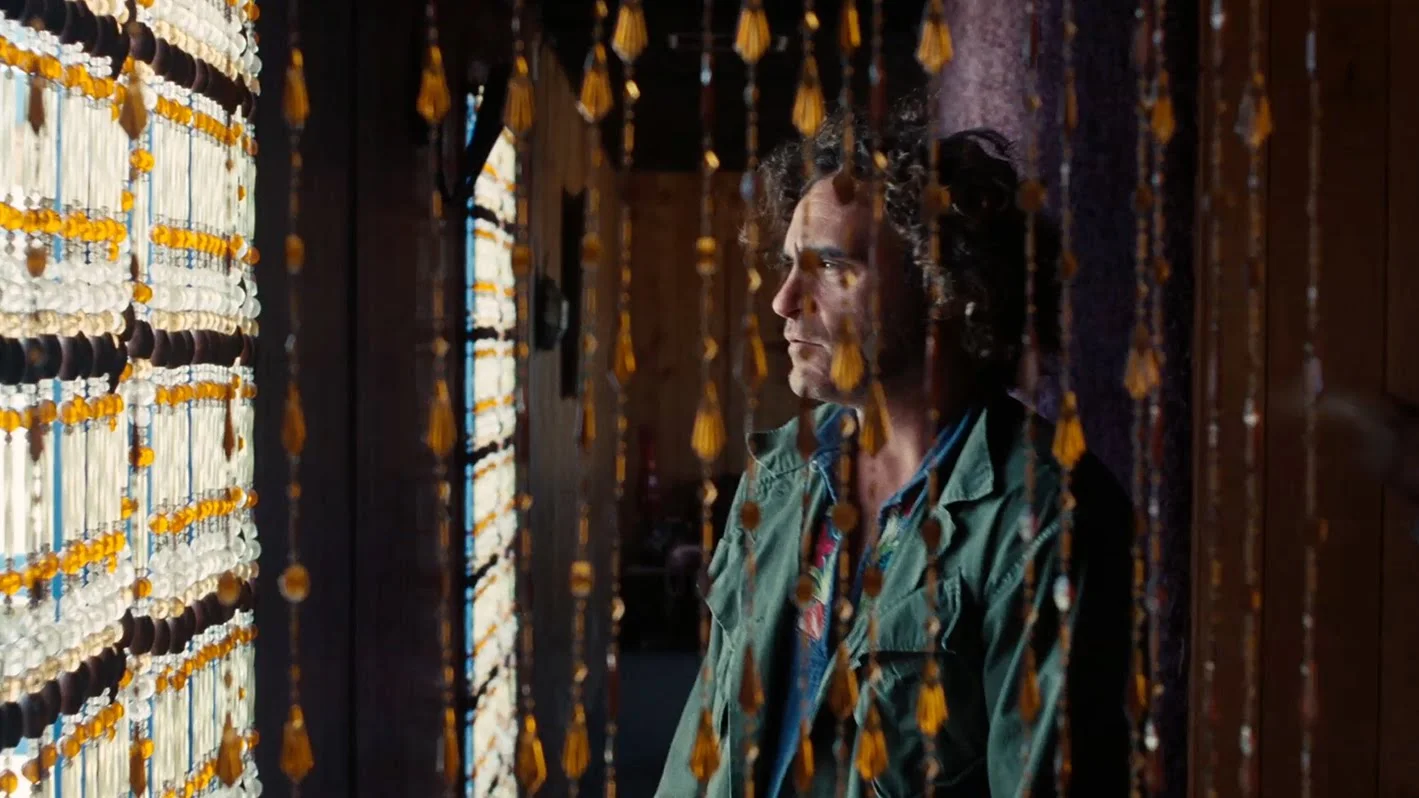Joaquin Phoenix in 'Inherent Vice.' Robert Elswit was the cinematographer on the film; he worked with Anderson on 'There Will Be Blood' and did Dan Gilroy's 'Nightcrawler.'
With 'Phantom Thread' now enjoying rave reviews, it's easy to forget the mixed reception that Paul Thomas Anderson's 'Inherent Vice' (his adaptation of the Thomas Pynchon novel of the same name) received in 2014/15. Some critics, while enjoying the film-making, soundtrack and atmosphere, found the plot to be too perplexing and convoluted.
I probably fell into the same category when I first saw the film of the afternoon of Christmas Eve 2014 (Angelika NYC, with my first La Colombe espresso in hand). I stepped in already a PTA fan ('There Will Be Blood' is one of my favorite films) and one who, at the time, had an internal thesis that 'The Master' gets better on each subsequent viewing. I remember my first impression of 'The Master', earlier that year, as "challenging."
Such is the concept of a film's resonance, and the weight of that resonance contributing to your own appreciation of a film. I learned this concept via The Playlist, an excellent film website.
After seeing 'Inherent Vice' that day, I left the theater very much confused by the plot, but also with an underlying nod of appreciation for the film's layers. I loved the cinematography - I saw it on 35mm and am a big of fan of DP Robert Elswit. Something about the filmmaking aesthetic felt very tactile and alive to me. I also distinctly remember another person in the theater telling his friend on the way out that "I have no idea what that movie was about."
And so I left 'Inherent Vice' there, on December 24th, 2014.
Manhattan Beach (JG, 2016).
Fast forward to spring 2016, and I'm in Manhattan Beach, LA. I'm noticing the socioeconomic realities of the place, contrasted to its much different past, while also being reminded of 'Inherent Vice.' Noticing this striking similarity, I discovered that "Gordita Beach", where Doc Sportello (Phoenix) resides, was inspired by Manhattan Beach, where Thomas Pynchon had spent time in the '60s and '70s.
Being there, and taking many photos, I began to understand the aesthetic feeling that contributed to the book, and, ultimately, the movie. I explored LA for an entire week, and thought that the LA feel presented in cinema was precisely like the LA feel you experience in person.
Thus, I began to think about 'Inherent Vice' more and more - its themes, its allure.
Fast forward again, to summer 2017, and I'm reading my first Pynchon novel, "The Crying of Lot 49." Excellent, but confusing. I'm noticing similar trends - a character trying to find her bearings in a changing world.
That's when I began to realize that through California, these characters, hippy culture, real estate and utility conglomerate conspiracies - that Pynchon is simply showing a changing world. The explosion of capitalism, mixed with changing social mores (and eventual push back from those changes), mixed with raw human feelings and emotions.
Doc Sportello, Oedipa - these protagonists, through their chase of mystery, are trying to find a core in a world that seems to be lacking one. Or the world is just changing too fast for them - or any human - to process. It's as if these social changes are faster than human evolutionary adaptations. These environments are too new and confusing. The hippy culture, perhaps, represented a rare sense of warmth among the madness, but, as that begins to quiet down and make way for the 70s and 80s, characters like Doc Sportello simply feel out of place.
Manhattan Beach, or Gordita Beach, went from an artistic beach town to a place only for those who can afford it. That change in the net effect may be of little consequence, but it shows the massive changes that have happened in a short period of time. The Docs of the world experience, feel and process these changes - all while still being human, and having the same human drives, emotions, needs and wants that we've always had.
I saw 'Inherent Vice' again this month (Metrograph NYC, this time). And, while the plot made more sense on second viewing, I tried my best to pay attention to the human element. That led to my true enjoyment of the film, and further respect for Pynchon and especially Anderson, who took a difficult piece of writing and made it digestible on the big screen.
The clip featured here shows behind the scenes footage, mixed with excerpts from Pynchon's novel. It's a great complement to the film.
- JG
Recommended article: Gortida Perdita: Manhattan Beach and ‘Inherent Vice’
Image via Fandango.



